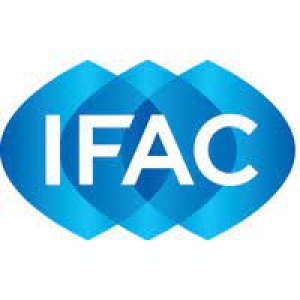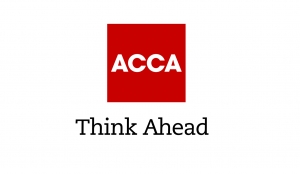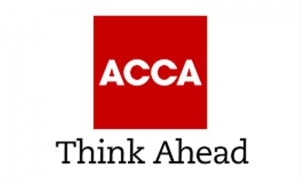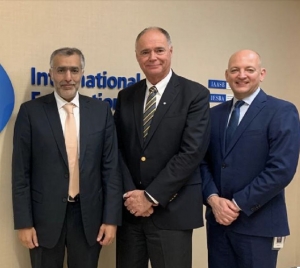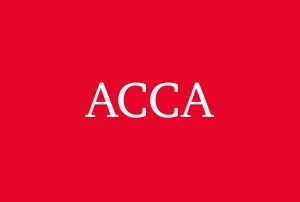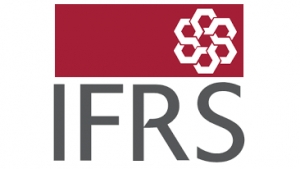عرض العناصر حسب علامة : ACCA
مهارات المستقبل بناء وظيفة مالية عامة مهنية
أصبح مشهد القطاع العام في جميع أنحاء العالم معقدًا بشكل متزايد، وهناك حاجة إلى مهارات المحاسبين المحترفين وخبراتهم ومبادئهم الأخلاقية الآن أكثر من أي وقت مضى.
معلومات إضافية
- نوع الفعالية مجانا
- بداية الفعالية الجمعة, 02 ديسمبر 2022
- نهاية الفعالية الجمعة, 02 ديسمبر 2022
- التخصص محاسبة ومراجعة
- مكان الفعالية اونلاين
معدلات نجاح اختبار جمعية المحاسبين القانونيين المعتمدين للطلاب الذين أجروا امتحاناتهم في سبتمبر 2022
جمعية المحاسبين القانونيين المعتمدين تعلن انه قد دخل عدد 83,630 جلسة سبتمبر، والتي شهدت إكمال 99,192 اختبارًا. أكمل ما مجموعه 3,426 طالبًا اختباراتهم النهائية ليصبحوا منتسبين للجمعية
معلومات إضافية
-
المحتوى بالإنجليزية
Pass rates have been announced by ACCA (the Association of Chartered Certified Accountants) for students who sat their exams in September 2022.
83,630 entered for the September sitting, which saw 99,192 exams completed. A total of 3,426 students completed their final exams to become ACCA Affiliates. Remotely invigilated exams continue to be popular with the number of students choosing this option being 13,321.
Alan Hatfield, executive director – content, quality and innovation, said: ‘It’s pleasing to see so many students continuing on their journey towards ACCA membership as demonstrated by this robust set of results.
This was the first examination session where we examined Professional Skills within our Strategic Professional Options AAA, AFM and APM examinations (ATX will change from June 2023). This is an important change in ensuring that our students are work ready and have the strong skills, abilities and competencies required for the future accountant. It’s also pleasing to see some students demonstrate their technical mastery of their chosen specialisms, alongside the professional skills they need to be a successful finance professional in the workplace. We continue to encourage students to make full use of our learning resources to support their studies towards these examinations.
We recommend that all our students use the ACCA exam Practice Platform, a free resource allowing them to practise questions and attempt mock exams with software that simulates the real exam platform. Accompanying the platform are guides to self-marking and debrief resources, to help students and tutors better understand performance. Pass rates remain up to 20% better for students who use the platform.
الإعلان عن معدلات النجاح لامتحان جمعية المحاسبين القانونيين المعتمدين ACCA في يونيو 2022
الإعلان عن معدلات النجاح من قبل جمعية المحاسبين القانونيين المعتمدين (ACCA) للطلاب الذين أجروا امتحاناتهم في يونيو 2022.
معلومات إضافية
-
المحتوى بالإنجليزية
Pass rates have been announced by ACCA (the Association of Chartered Certified Accountants) for students who sat their exams in June 2022.
101,866 entered for the June sitting, which saw 122,756 exams completed. A total of 3,877 students completed their final exams to become ACCA Affiliates. Remotely invigilated exams continue to be popular with the number of students choosing this option rising to 15,474.
Alan Hatfield, executive director – content, quality and innovation, said: ‘These are a strong set of mid-year results and we’re pleased to see so many students continuing on their journey towards ACCA membership.
The ACCA Qualification continuously focuses on ensuring that our students have the appropriate skills, abilities and competencies required for the future accountant. In support of our improvement plan students will be aware that from the September 2022 exam session we are introducing professional skills marks into the Strategic Professional Options examinations.
This is a progressive innovation which will enable ACCA students to demonstrate their technical mastery of their chosen specialisms, alongside the professional skills they need to be a successful finance professional in the workplace. The changes from September are in our AAA, AFM and APM examinations - ATX will change from June 2023. If you’re a student planning to sit AAA, AFM or APM in September, we have a selection of fantastic learning resources to help support you with this exciting change and achieve success.’
Exam results
The ACCA Qualification rigorously tests the skills, abilities and competencies that a modern-day accountant needs, with a firm grounding in ethics and professionalism. It prepares students for a rewarding career as a qualified and ethical finance professional.
Results below also include those delivered via ACCA’s on-demand offering for Foundation Diplomas, Applied Knowledge and Law exams. These accounted for a further 33,474 exams, of which over 1,978 were made possible through remote invigilation.
معهد المعلم الشريك الذهبي لشهادة المحاسبة القانونية ACCA
تمكن معهد المعلم من الحصول على الثقة المهنية والأكاديمية بالحصول على فئة الشريك الذهبي لإعتمادية جمعية المحاسبين المحترفين المعتمدين البريطانية (ACCA) خلال شهر مارس الماضي 2022، وذلك ضمن استراتيجية المعهد وخططه التطويرية.
بالإجماع انضمام جمعية الإمارات للمحاسبين والمدققين إلى عضوية الاتحاد
صوّت مجلس الاتحاد الدولي للمحاسبين (IFAC) وهو المنظمة العالمية لمهنة المحاسبة والتدقيق التي تتخذ من مدينة نيويورك في الولايات المتحدة الامريكية مقراً لها، بالإجماع على قبول انضمام جمعية الإمارات للمحاسبين والمدققين وهي الجمعية المهنية الوطنية المعنية بمهنة المحاسبة والتدقيق في دولة الإمارات العربية المتحدة، كعضو في الاتحاد الدولي للمحاسبين، وذلك خلال الاجتماع الرابع والخمسين للمجلس والمنعقد خلال شهر نوفمبر 2021.
إعادة التفكير في الإدارة المالية العامة
يجب على الحكومات أن تستثمر في أنظمة إدارة الشؤون المالية العامة الخاصة بها الآن حتى تكون مرنة بما يكفي للتعامل مع الأزمات في المستقبل.
معلومات إضافية
-
المحتوى بالإنجليزية
How should governments evolve their PFM systems to be better prepared for future crises?
Public financial management (PFM) is the way governments manage public resources, including collecting revenue and controlling expenditure, and the impact such resources have on the economy and society. How good a government is at PFM made a real difference to citizens and businesses during the Covid-19 pandemic. Quite literally, it could be the difference between living and dying, survival or bankruptcy.
We used a global survey of 1,500 respondents, discussions with 45 practitioners, and desk research to answer two research questions:
How well have governments responded to the pandemic?
What are the future challenges for PFM arrangements?
Our report, Rethinking Public Financial Management (PDF, 3.8 MB), captures and discusses answers to these questions. There are noticeable differences between regions and there are some areas of concern, such as whether there is sufficient transparency and accountability about the extra money spent to tackle the pandemic. (The IMF reported global spending of $16 trillion in the year to April 2021, which is more than the annual gross domestic product of China.)
The report has 21 actionable recommendations. The key recommendation is governments must invest in their PFM systems now so that they are flexible and resilient enough to deal with crises in the future.
Whether and when crises arise in the future, improving PFM will help governments in the delivery of all their services and achieving the UN's Sustainable Development Goals.
أبوغزاله: البحث عن استراتيجية انخراط منطقة الشرق الأوسط وشمال افريقيا MENA في مهنة المحاسبة العالمية
شارك عضو مجلس إدارة المجمع الدولي العربي للمحاسبين القانونيين وممثل المجمع في فلسطين الأستاذ جمال ملحم في الاجتماع الدوري للجنة تطوير منظمات المحاسبة المهنية PAODAG التابعة للاتحاد الدولي للمحاسبين
معايير ISSB لمساعدة البلدان النامية
حظي تشكيل مجلس معايير الاستدامة الدولية بترحيب واسع النطاق من قبل المنظمين وواضعي المعايير في جميع أنحاء العالم حيث يتم إخطار الشركات بضرورة استعدادها لمتطلبات إعداد التقارير في وقت مبكر من نهاية عام 2022.
معلومات إضافية
-
المحتوى بالإنجليزية
ISSB standards to help developing countries
READING: ISSB standards to help developing countries
Responses from key bodies to the announcement about sustainability standards highlight urgency
SHARE
Share via twitter
Share via facebook
Share via linkedin
Share via emailClose share panel
Scenes from COP26
The formation of the International Sustainability Standards Board has been widely welcomed by regulators and standard setters across the world as companies are put on notice that they should be prepared for reporting requirements to emerge as early as the end of 2022.
Klaas Knot, vice chair of the Financial Stability Board, said at the COP26 summit that the recommendations of the Task Force for Climate-related Disclosures have ‘gained enormous traction in the private and public sectors’ and that their ‘success has exceeded our expectations’, but the limits of what can be achieved by a voluntary framework have been reached.
‘The development of global minimum standards is the next level, and we welcome the formation of the ISSB,’ he said.
‘Get ready to start reporting at the end of 2022 or the beginning of 2023’
Where it's at
The ISSB will have a global and multi-location presence. According to the IFRS Foundation, all regions – the Americas, Asia-Oceania, Europe, the Middle East and Africa – will be covered. ‘Engagement with developing and emerging economies will be an important priority,’ it says.
Offices in Frankfurt (the seat of the board and the office of the chair) and in Montreal will be responsible for key functions supporting the new board and deeper co-operation with regional stakeholders. Offices in San Francisco and London will provide technical support and platforms for market engagement.
The IFRS Foundation says it is working with Frankfurt and Montreal to enable the ISSB to start work early in 2022. Further discussions will continue with proposals for offices from Beijing and Tokyo to finalise the new Board’s footprint in the Asia Oceania region.
Ashley Alder, chairman of the board of the International Organization of Securities Commissions (IOSCO), told the summit that the new ISSB standards would be subject to a process of oversight and technical assessment, similar to the process for IFRS.
‘Global standards don’t have automatic effect in national law, but IOSCO can act as a bridge,’ he said. ‘If we endorse the ISSB standards it will send a strong message to others. We see endorsement as the catalyst to getting the standards implemented quickly, and I’m confident we will get the job done, as we did with IFRS.’
Prepare now
Given that preparation work for the ISSB’s output is already well advanced, companies should begin their preparations as soon as possible by looking at the prototype standard published by the IFRS Foundation, he added, and ‘get ready to start reporting at the end of 2022 or the beginning of 2023.’
On Wednesday, Mark Carney, co-chair of the Glasgow Financial Alliance for Net Zero (GFANZ), told the summit that US$130 trillion in private capital had been raised through GFANZ from over 450 firms in 45 countries to transform the economy for net zero.
‘The money is here if the world wants to use it,’ he said, but he stressed that the ‘plumbing’ had to be in place to ensure the money was effectively targeted. The ISSB standards are seen as a key part of that process.
The new standards need to be ‘appropriate for emerging economies or there is a risk they will be excluded’
Mari Pangestu, managing director of development policy and partnerships at the World Bank said that adopting IFRS had allowed emerging economies to access capital, and the ISSB standards could have the same effect.
‘If we get this right,’ she said, ‘we will unlock pots of money, a large proportion of which will go to developing countries.’
But she warned that the new standards (and associated taxonomies and ESH methodologies) needed to be ‘appropriate and proportionate for emerging economies. It’s important that we look at their needs and support them in implementation or there is a risk they will be excluded.’
Ensuring quality
The European Commission has strongly welcomed alignment of sustainability standards, said Alexandra Jour-Schroeder, deputy director-general, DG FISMA at the EC, but she added that it was vital that the global baseline set by the ISSB’s standards should not be the lowest common denominator. ‘They need to be ambitious,’ she said. ‘The floor, and not the roof.’
Grant Vingoe, chair and CEO of the Ontario Securities Commission, predicted that there would be ‘a rapid change in the evolution of requirements’ from this point. ‘It will be important for us to build a strong supervisory programme,’ he added.
Satoshi Ikeda, chief sustainable finance officer at the Japan Financial Services Agency, said the agency had been anticipating the formation of the ISSB and was ‘very encouraged by developments so far.’ - البلد الأردن
مؤسسة IFRS تشكل مجلس معايير الاستدامة الدولية، وتدمج مؤسسة الإبلاغ عن القيمة VRF ومجلس معايير الإفصاح عن المناخ CDSB
أطلقت مؤسسة المعايير الدولية لإعداد التقارير المالية رسمياً مجلس معايير الاستدامة الدولية يوم الأربعاء الماضي وأعلنت عن خطط لتوحيد مؤسسة الإبلاغ عن القيمة -المجموعة المدمجة حديثًا التي توحد مجلس معايير محاسبة الاستدامة مع المجلس الدولي للإبلاغ المتكامل -بالإضافة إلى مجلس معايير الإفصاح عن المناخ، وهو مبادرة من مشروع الافصاح عن الكربون بحلول يونيو 2022.
معلومات إضافية
-
المحتوى بالإنجليزية
IFRS Foundation forms International Sustainability Standards Board, consolidates VRF and CDSB
By Michael Cohn
November 03, 2021, 6:45 a.m. EDT
17 Min Read
Facebook
Twitter
LinkedIn
Email
Show more sharing options
The International Financial Reporting Standards Foundation formally launched the International Sustainability Standards Board on Wednesday and announced plans to consolidate the Value Reporting Foundation — the recently merged group uniting the Sustainability Accounting Standards Board with the International Integrated Reporting Council — as well as the Climate Disclosure Standards Board, an initiative of the Carbon Disclosure Project, by June 2022.
The move to merge together the VRF, SASB, the IIRC and the CDSB within one sustainability standard-setter comes in response to demands from financial regulators at the International Organization of Securities Commissions and investors for more alignment between the sometimes competing standards and frameworks for environmental, social and governance reporting, to avoid greenwashing by companies. The formal launch was timed to coincide with the United Nations’ COP26 climate change conference in Glasgow, Scotland, where world leaders are meeting to talk about how to curb the accelerating pace of rising temperatures and natural disasters across the planet. The new International Sustainability Standards Board is expected to develop a comprehensive global baseline of high-quality sustainability disclosure standards to meet investors’ information needs.
Last year, SASB and the IIRC announced plans to merge to form the Value Reporting Foundation, with the possibility of the CDSB joining them as well. The three groups, along with the Carbon Disclosure Project and the Global Reporting Initiative, all agreed to further align their standards, but the IFRS Foundation, which also oversees the International Accounting Standards Board, soon announced its own plans to explore the creation of an International Sustainability Standards Board that it would oversee alongside the IASB (see story). Most of the other standard-setters had agreed to participate in a Technical Readiness Working Group for the proposed ISSB, but now it appears most of them will be absorbed into the new ISSB. The GRI, however, is still expected to remain independent after the ISSB is formed.
Input a lease in as little as 3 minutes with LeaseCrunch
SPONSOR CONTENT FROM LEASECRUNCH
“Sustainability, and particularly climate change, is the defining issue of our time,” said IFRS Foundation chair Erkki Liikanen in a statement. “To properly assess related opportunities and risks, investors require high-quality, transparent and globally comparable sustainability disclosures that are compatible with the financial statements. Establishing the ISSB and building on the innovation and expertise of the CDSB, the Value Reporting Foundation and others will provide the foundations to achieve this goal.”
They are also publishing prototypes of climate and general disclosure requirements developed by the Technical Readiness Working Group, a group formed by the IFRS Foundation Trustees to undertake preparatory work for the ISSB. The prototypes are the result of six months of joint work by representatives of the CDSB, the IASB, the Financial Stability Board’s Task Force on Climate-related Financial Disclosures (TCFD), the VRF and the World Economic Forum, supported by the International Organization of Securities Commissions (IOSCO) and its Technical Expert Group of securities regulators. The TRWG has consolidated some aspects of these organizations’ content into a unified set of recommendations for consideration by the ISSB.
The ISSB will sit alongside and work in close cooperation with the IASB to provide connectivity and compatibility between IFRS accounting standards and the ISSB’s standards, which will be called IFRS Sustainability Disclosure Standards. Both boards will be overseen by the IFRS Foundation trustees, who in turn will be accountable to a Monitoring Board of capital market authorities responsible for corporate reporting in their jurisdictions. The ISSB and the IASB will be independent, and their standards will complement each other to provide comprehensive information to investors and other providers of capital.
‘Development of the ISSB’s global baseline will deliver transformative change in sustainability disclosures for the financial markets,” Mary Schapiro, former chair of the Securities and Exchange Commission, and current head of the TCFD Secretariat, said in a statement. “The TCFD welcomes the formation of the ISSB, which builds upon the foundation of the globally-accepted TCFD framework and the work of an alliance of sustainability standard setters. The ISSB represents a major step forward in establishing consistent, comparable global reporting standards.”
Richard Sexton and Robert K. Steel, co-chairs of the Value Reporting Foundation Board, backed the move to consolidate their organization within the new ISSB. “Today’s announcement is a reflection of the changed world we live in — a world in which sustainability and long-term thinking are increasingly at the heart of business and investor decision-making,” they said in a joint statement. “This is a transformation that both the IIRC and SASB helped lead, made possible by the many thousands of stakeholders who volunteered time and offered resources to develop the Integrated Thinking Principles, Integrated Reporting Framework and SASB Standards that are today used by businesses and investors around the world. The Value Reporting Foundation Board believes the consolidation announced today will help deliver effective disclosures to drive global sustainability performance. We count on your continued collaboration as we embark on this exciting next step.”
CDSB chairman Richard Samans and CDP CEO Paul Simpson also issued a joint statement of support. “CDP pioneered environmental disclosure 20 years ago and has hosted CDSB since its formation in 2007,” they stated. “CDSB’s global partnership of business and environmental organizations supported by the international accounting community was formed to create a generally-accepted framework for corporate reporting of material climate, environmental and social information to investors and regulators.”
The ISSB plans to develop IFRS Sustainability Disclosure Standards, including disclosure requirements to address companies’ impacts on sustainability matters relevant to assessing enterprise value and making investment decisions. The ISSB standards will be developed to facilitate compatibility with requirements that are jurisdiction specific or aimed at a wider group of stakeholders (such as the European Union’s planned Corporate Sustainability Reporting Directive as well as initiatives in the Americas and Asia-Oceania).
The G20 Finance Ministers and Central Bank Governors and the Financial Stability Board both welcomed the IFRS Foundation’s work program to develop global baseline standards for sustainability disclosures.
The IFRS Foundation reached commitments with the CDSB, whose secretariat is hosted by CDP, and the VRF to consolidate their technical expertise, content, staff and other resources with the IFRS Foundation. The technical standards and frameworks of the CDSB and the VRF, along with those of the TCFD and the Forum Stakeholder Capitalism Metrics, will provide a basis for the technical work of the new board.
“We become part of the IFRS Foundation,” said Neil Stewart, director of corporate outreach at the Value Reporting Foundation. “We become the foundation of the ISSB. What’s really great is that this is not just a matter of us handing over our standards and riding off into the sunset. This is really consolidating our people, our relationships, our IP. We’re bringing over a decade of work, of partners, of all those networks and relationships that have gone into the creation of the SASB standards and the integrated reporting framework. We’re bringing that into the ISSB. Don’t just look at this as a set of standards and a framework that they pick up and run with. It’s a whole ecosystem that now is kind of like a chrysalis coming out and hatching into the ISSB.”
Recognizing the urgency and the desire to provide the ISSB with a solid foundation on which to start its work, the trustees created the TRWG, which includes representatives from the CDSB, TCFD, IASB, VRF and the World Economic Forum, to provide recommendations to the ISSB. The TRWG has concluded its work on two prototype documents that were published Wednesday, one focusing on climate-related disclosures that build on the TCFD’s recommendations, and include industry-specific disclosures, and a second setting out general sustainability disclosures. The intention is for the ISSB to consider the prototypes as part of its initial work program.
The ISSB will also draw upon expertise from several advisory groups. Technical advice on sustainability matters will be provided to the ISSB by a new Sustainability Consultative Committee, whose members will include the International Monetary Fund, the Organization for Economic Cooperation and Development, the United Nations, the World Bank and other experts drawn from public, private and nongovernmental organizations.
The remit and expertise of the IFRS Advisory Council will be extended to provide strategic sustainability-related advice and counsel to the ISSB, as well as the IFRS Foundation trustees and the IASB. Finally, the trustees have formed a working group to create a mechanism for formal engagement on standard-setting between the ISSB and jurisdictional representatives, including from emerging markets (similar to the Accounting Standards Advisory Forum, which plays this role for the IASB).
The IFRS Foundation said it intends to leverage the existing CDSB and VRF advisory groups, which include investors and other experts who have demonstrated long-standing support for improved sustainability disclosure. In addition, the World Economic Forum’s private sector coalition will be engaged. The IFRS Foundation intends to use the International Integrated Reporting Council to give it advice on establishing connectivity between the work of the IASB and the ISSB through the fundamental concepts and guiding principles of integrated reporting.
The ISSB will have a global and multi-location presence. All regions of the world — the Americas, Asia-Oceania and EMEA (Europe, the Middle-East and Africa) — will be covered. Engagement with developing and emerging economies will also be a big priority.
The IRS Foundation Trustees are currently in advanced stages in appointing a chair and vice-chair(s) to the ISSB. They have also begun to search for additional board members up to the full complement of 14 members .
The ISSB’s work is expected to begin as soon as the chair and vice-chairs have been appointed and to begin with public consultations to inform the ISSB’s work plan and on proposals informed by recommendations from the TRWG. Following these consultations, the ISSB’s work will follow the IFRS Foundation’s due process, including public discussions by the ISSB of feedback received in response to consultations and possible improvements to the proposals prior to their finalization as standards. The entire process will be overseen by the IFRS Foundation trustees’ Due Process Oversight Committee.
It’s unclear what will happen to the ongoing work of the Value Reporting Foundation and its SASB Standards Board, as well as the new board members that the VRF named only last week, but Stewart said they would continue to meet and work on their new standards until the merger closes next June. The VRF and SASB Standards Board had been working on other initiatives besides climate change issues, in the areas of human capital, diversity, mining industry tailings management, internet content moderation and other projects.
“It’s important for us not to preempt the work of the ISSB,” said Stewart. “The chair, vice chair and board members haven’t been named. The very first thing that has to happen is for the ISSB to go out on a public consultation, not only on the climate disclosure standard, which should be the first order of business because of the urgency of climate change, they will be consulting too on what will be their priority issues. The ISSB will need to follow a very rigorous due process, which the IFRS Foundation is uniquely positioned to steer because of their history with the IASB. I would never say that here is the ISSB’s research agenda and it includes all of these research projects because it doesn’t exist yet. They have to do that public rigorous process, but those projects won’t stop in their tracks tomorrow. The SASB standards will continue to be maintained and used in the near future and the near and median term as the ISSB gets set up and they go through the initial process with the climate disclosure standard and get up and running. The merger won’t close for another eight months, and in the meantime everything keeps running.”
Reactions
Another ESG standard-setter, the Global Reporting Initiative, has not announced plans to become part of the ISSB, but expressed its readiness to engage with the group.
“GRI is pleased that the IFRS Foundation has recognized the merits of incorporating sustainability considerations into financial disclosures, through the creation of a sustainability standards board,” said GRI interim CEO Eric Hespenheide in a statement. “We also welcome that the reporting organizations with a core focus on investors needs are to come together under one house. We advocate for a comprehensive corporate reporting system, with a two-pillar structure in which robust sustainability and financial reporting are on an equal footing. The sustainability pillar, under which GRI sits, addresses a company’s external impacts on society and the environment, while the financial pillar needs to reflect sustainability risks to a company’s value. Today’s announcement marks a significant step toward strengthening that second pillar. Disclosure on a company’s financially material sustainability topics — while important from the context of helping markets to assess opportunities and risks — is not sufficient to deliver full transparency on sustainability impacts, as envisioned by the GRI standards and embraced by the EU. Corporate transparency that meets the needs of all stakeholders requires improved connectivity between sustainability and financial reporting. I therefore reiterate once again that GRI stands ready to engage with the IFRS Foundation in support of this aim. We look forward to hearing more about the remit and scope of their new ventures, as well as inputting to the development of the proposed climate standard.”
KPMG welcomed the new group. “Today’s announcement by the IFRS Foundation is a watershed moment for sustainability disclosure standards and an important step that will help harness our capital markets to secure a sustainable future,” said KPMG global chairman and CEO Bill Thomas in a statement. “You can’t change what you can’t measure, and the creation of globally consistent and transparent sustainability disclosure standards will strengthen our capital markets by helping investors and business leaders make better decisions and refocus their dynamism on long-term value creation. We all need to recognize that we have a role to play in helping solve society’s biggest challenges. The IFRS Foundation is a key ally and I am proud that KPMG has supported them on this important initiative, including through our work on Stakeholder Capitalism Metrics with the World Economic Forum.”
The Association of Chartered Certified Accountants also expressed its support. “This development means we now have a once in a lifetime opportunity to help shape global reporting standards for the benefit of investors, economies and the public good,” said Helen Brand, chief executive of ACCA and co vice-chair of the Value Reporting Foundation board, in a statement. “In December 2020, we expressed strong support for the creation of the ISSB. This is needed to address the scale of global environmental and social challenges today, accelerate the necessary reallocation of capital, and drive positive changes in corporate decision-making. With the global reach of the International Integrated Reporting Framework and the SASB Standards, the VRF can help the ISSB to achieve much-needed consistency in reporting across the world. The IFRS Foundation’s commitment to build connectivity between financial and sustainability reporting using the principles of integrated reporting is particularly welcome. We believe that this is vital to high-quality connected corporate reporting.’
ACCA also published Wednesday a policy paper, Principles for connected corporate reporting standard setting, which calls for a consistent and connected set of global reporting standards and aligns with much of what the ISSB and the VRF will be doing.
The International Federation of Accountants, which had called last year for the creation of the ISSB along with the International Organization of Securities Commissions, also pledged its support. IFAC also welcomed the commitments to combine the CDSB and Value Reporting Foundation with the IFRS Foundation to provide much needed consolidation and contributing support and resources toward the success of the new ISSB.
“Now is the time for policymakers around the world to focus on how to capitalize on the forthcoming work of the ISSB,” said IFAC CEO Kevin Dancey in a statement. “As with the success of IFRS Standards for financial reporting, IOSCO’s support is key. Jurisdictions around the world need to take the next step—deciding to use, implement, and enforce IFRS Sustainability Disclosure Standards as part of a Building Blocks Approach that will deliver the global baseline for sustainability-related reporting needed for investors and capital markets.”
The International Public Sector Accounting Standards Board also praised the formation of the ISSB. “Climate change is an issue that is increasingly important to us all,” said IPSASB chair Ian Carruthers in a statement. “Urgent public sector action will be critical to successfully addressing climate change, through the combination of its central roles as policy setter, regulator, funder and in service delivery. Strong governance, effective implementation, and accountability for the use of public sector resources will all be essential if governments are to play their parts in addressing climate change and sustainability more broadly.”
KPMG's U.S. firm also offered its support for ISSB. “Today’s announcement by the IFRS Foundation advances the march toward ESG engagement on a more global scale,” said KPMG audit vice chair Scott Flynn in a statement. “At KPMG, we support the development of a baseline global ESG reporting standard to reduce complexity and achieve greater relevance, consistency, reliability, and comparability in ESG reporting. This announcement serves the capital markets by helping investors achieve their ESG goals that will power global solutions to societal challenges. It also underscores the need for companies to prepare now. Embedding ESG engagement throughout one’s organization and transformation requires scenario planning, materiality assessments, strategy, operations, assurance, and more. It demands an all-hands mentality to meet this all-hands moment.”
“At KPMG, we believe ESG engagement makes business better,” said KPMG Impact leader Rob Fisher in a statement. “The announcement today by the IFRS Foundation is a big step forward in the development of a baseline global ESG reporting standard that can accelerate the financing of private-sector solutions to society’s most pressing problems. It will also help many companies seeking to go from ‘why’ to ‘how’ when it comes to ESG engagement by reducing complexity in reporting and helping them tell their ESG story to investors. Deep engagement on strategy, operations, and reporting has the potential to create a virtuous circle or ‘flywheel effect,’ powering transformation that drives measurable profitability and sustainability today and tomorrow. Today’s announcement has flywheels spinning faster.”
The Center for Audit Quality also applauded the move.
“Investors are clear that climate and other ESG-related disclosures are integral to their investment decisions,” said CAQ CEO Julie Bell Lindsay in a statement. “Today’s ISSB announcement is a positive step forward to providing a global baseline to deliver consistent and comparable sustainability standards.”
The Institute of Management Accountants also released a statement of support for the ISSB. “As described, this ISSB will work in close cooperation with the International Accounting Standards Board under the Foundation’s governance structure,” said the group. “IMA is also pleased to observe the commitments to combine the Value Reporting Foundation and the Climate Disclosures Standards Board into the foundation of the ISSB. This week, with the endorsement of its Sustainable Business Management Global Task Force, IMA released its Statement of Position on Sustainable Business Information and Management and observes that the IFRS Foundation’s measure aligns with several of the articulated principles such as reducing fragmentation in ESG reporting, reflecting existing precedent around materiality with respect to investors and the securities markets, and focusing holistically on value creation. It also signals alignment with our principles related to supporting small and medium sized enterprises, internal controls, and the use of technology, particularly digital reporting. Management is a critical information user and stakeholder, and we encourage additional steps to ensure that the new accounting paradigm promotes trust, builds value and facilitates action.” - البلد عالمي
يفقد الانتعاش الاقتصادي زخمه في الربع الثالث بسبب ارتفاع الأسعار والنقص الذي يعوق النمو
نمو عالمي مرتفع مع تعافي البلدان من الآثار الاقتصادية للوباء التي ضعفت في الربع الثالث، لكن الثقة والأوامر لا تزال عند مستويات عالية، وفقًا لأحدث مسح اقتصادي عالمي من ACCA (جمعية المحاسبين المعتمدين) وIMA (معهد المحاسبين الاداريين).
معلومات إضافية
-
المحتوى بالإنجليزية
High global growth as countries bounce back from the economic effects of the pandemic weakened in Q3, but confidence and orders remain at high levels, according to the latest Global Economic Survey from ACCA (the Association of Chartered Certified Accountants) and IMA (Institute of Management Accountants).
Global confidence fell by nine points in Q3, with falls in Western Europe (-24) and North America (-41) pulling down the score. However, both regions are still at relatively high levels of confidence, as is the case globally. In fact, confidence jumped in Asia Pacific (+11) and South Asia (+20), after falls in the previous survey.
The Middle East was the only region to record improved confidence for the six months of Q2 and Q3.
As regards orders, which is a useful benchmark to measure real economic activity – there was a split between advanced regions and emerging markets. There were falls in orders affecting North America and Western Europe contrasted with modest improvements in emerging markets.
However, the wider economic prospects in developed economies remain brighter than in emerging markets, where low vaccination rates continue to drag on economic recovery.
And, apart from Africa, all major regions are now reporting order levels above their pre-pandemic level, indicating a continued global recovery.
Another positive indication from the survey are the two ‘fear indices’, which measure concern that customers and suppliers may go out of business. Both declined again in Q3 and are now back in line with their long-run average levels after spiking around Q2 2020.
Concern about operating costs is now at its highest level since the start of 2019 and increased five points in Q3. This is driven by higher transport and commodities costs, leading to higher inflation and weaker growth now.
Michael Taylor, chief economist at ACCA, said: ‘A moderation in growth was to be expected, as the pace set earlier this year could not be maintained indefinitely.
‘Although confidence and orders have lost momentum in regions including North America and Western Europe, we are still seeing an encouraging picture of global economic recovery overall.
‘Concerns about extra operating costs for businesses should prove temporary as the price mechanism operates to encourage increased supply and reduced demand. But for now, the effects are to moderate global growth from a rapid to a steady pace. Nevertheless, growth should be sufficient for more economies to regain their pre-pandemic level of activity by the end of the year.’
‘Although economic growth has slowed in many regions and the prevalence of the Delta variant of COVID-19 particularly in developed countries expectedly drove down global confidence, underlying demand remains strong,’ said Loreal Jiles, vice president of research and thought leadership at IMA.
‘As COVID-19 vaccinations continue to increase and we remedy supply shortages and increased prices in advanced economies, there is an opportunity for overall confidence to increase significantly.’
The full GECS report can be found here:
https://www.accaglobal.com/gb/en/professional-insights/global-economics/gecs_q3_2021.html

